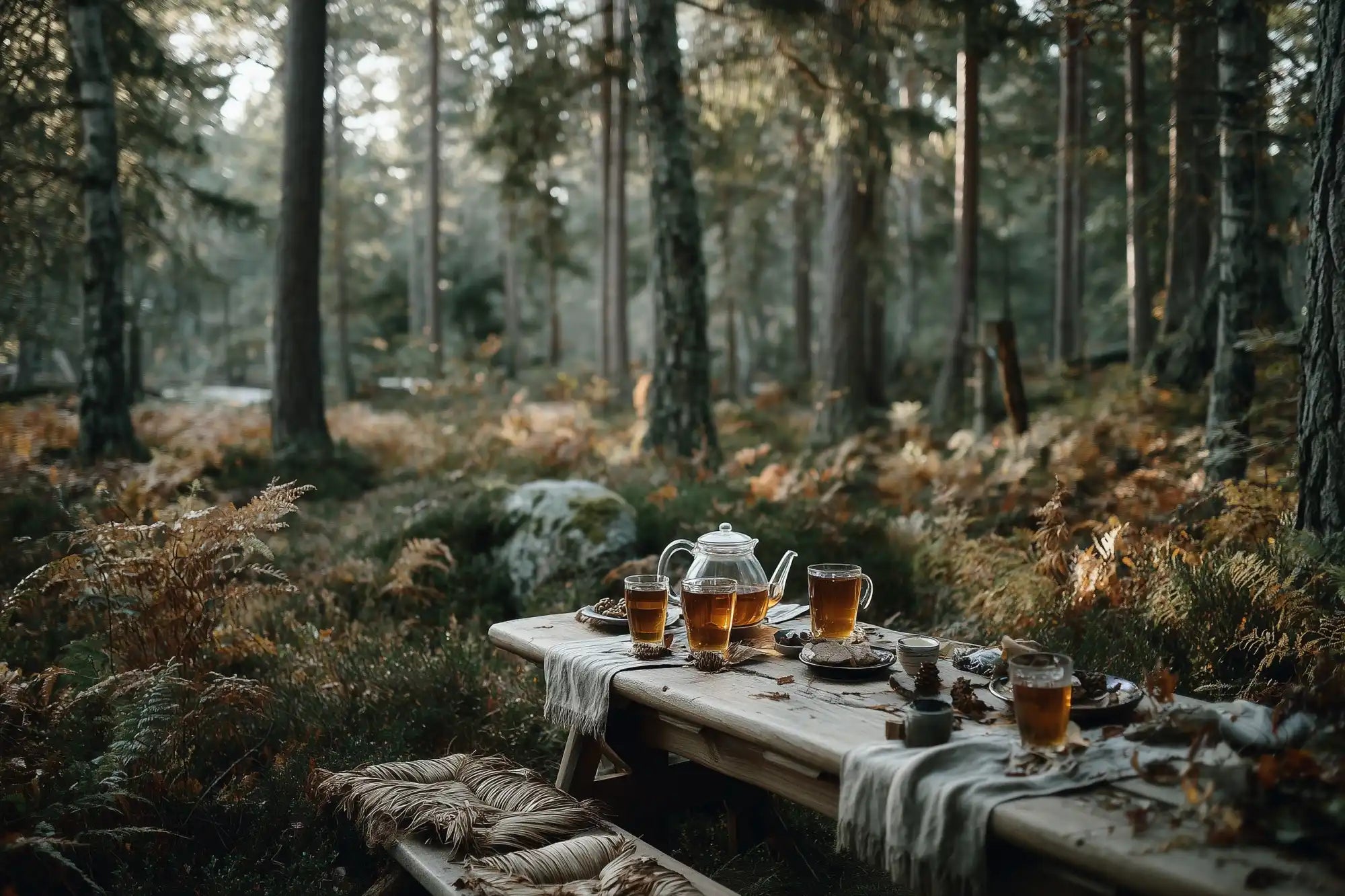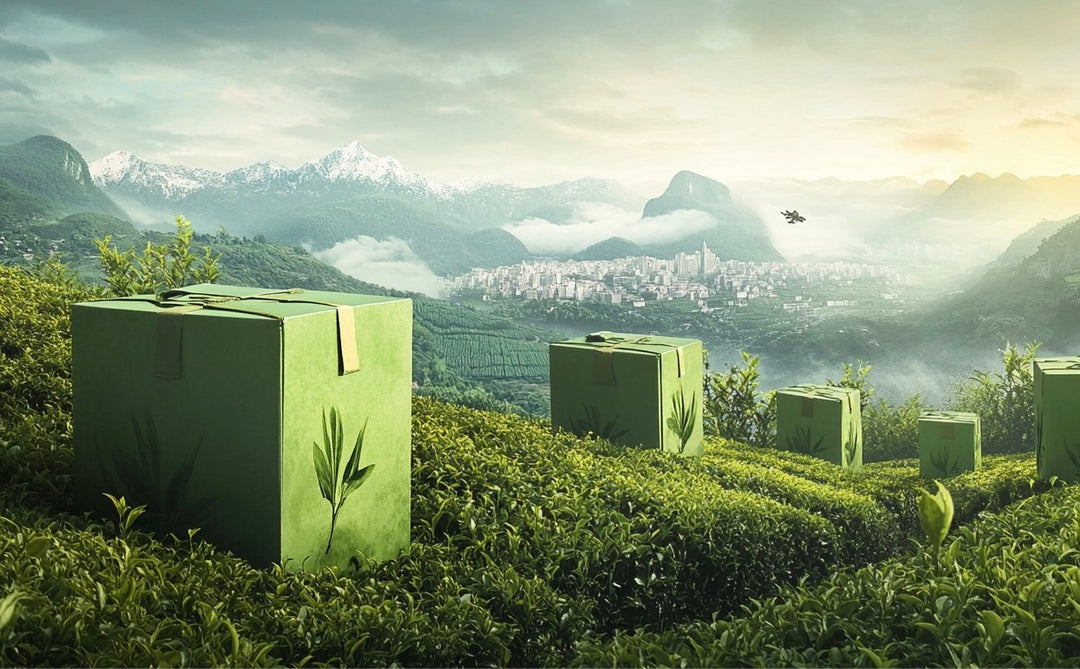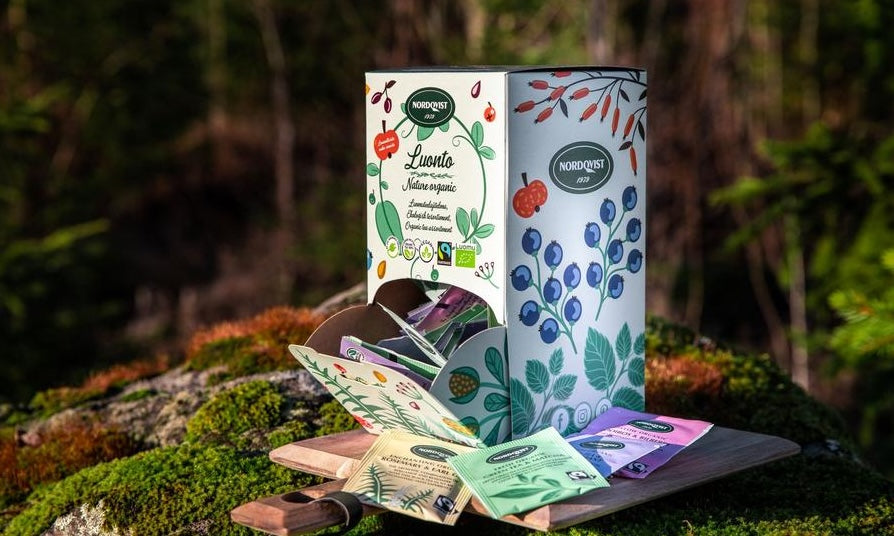
NORDQVIST FAQ
Your frequently asked questions answered!
Deep dive into our frequently asked questions to find out about our teas and order process.
General Questions
Different teas require slightly different brewing temperatures and times to bring out their best flavor. Here’s how to succeed:
Black tea: 95 °C, 2 minutes
Green tea: 75–80 °C, 1–2 minutes
White tea: 75–80 °C, 2 minutes
Rooibos: 95 °C, 2 minutes
Herbal and fruit infusions: 95 °C, 2–5 minutes
Always use fresh water, and let it cool slightly before preparing green or white tea. You’ll also find more detailed instructions on Nordqvist’s tea packages and in the product descriptions on our website.
No, they don’t. Black, green, and white teas naturally contain caffeine, as they are made from the leaves of the Camellia sinensis plant. Herbal teas and rooibos, on the other hand, are caffeine-free, since they are not true teas but infusions made from other plants.
In our selection, you’ll find both caffeinated and caffeine-free options to suit different needs and moments.
Tea itself is almost calorie-free. A regular cup of black, green, or white tea without sweeteners or milk contains only about 0–2 kilocalories. Added flavors also do not significantly increase the energy content.
The calorie count may rise if you add sugar, honey, or milk to your tea. However, plain brewed tea is an excellent choice for a light and virtually calorie-free drink.
Although black, green, and white teas look and taste different, they all come from the same plant: Camellia sinensis. The differences arise from how the tea leaves are processed after harvest. The degree of oxidation, the age of the leaves, and the drying methods all affect the tea’s color, flavor, and caffeine content.
Black tea is fully oxidized. This means the leaves are deliberately exposed to oxygen before drying. The chemical change darkens the leaves and deepens the flavor. Thanks to oxidation, black tea has a strong, full-bodied taste, often with malty or spicy notes.
Green tea is not oxidized. Immediately after picking, the leaves are either steamed (Japanese style) or lightly pan-fired (Chinese style) to halt oxidation. This allows the leaves to retain their natural green color and fresh flavor.
White tea is the least processed of all. It is made only from the youngest buds and delicate leaves, which are handpicked and slowly dried without oxidation. As a result, the leaves keep their natural pale or silvery appearance, and the brewed tea is almost colorless or a very light yellow.
The amount of caffeine in one cup of tea (about 200 ml) varies depending on the type of tea, the amount of leaves used, and the brewing method.
Black tea contains on average about 40–70 mg of caffeine per cup. It is the most oxidized of the teas, and since it is often brewed in hotter water and for longer than other teas, it generally has the highest caffeine content.
Green tea contains about 20–45 mg of caffeine per cup. Because it is not oxidized and usually brewed in slightly cooler water than black tea, its caffeine level is typically lower.
White tea is the least processed tea and usually has a lower caffeine content, around 15–30 mg per cup. However, since it often uses young buds and early leaves, which naturally contain more caffeine, some white teas can have nearly as much caffeine as green tea.
For comparison, a regular cup of coffee (about 200 ml) usually contains 80–120 mg of caffeine.
Environment & Sustainability
No, they don’t. All Nordqvist tea bags are plastic-free and contain no micro- or nanoplastics. Each tea bag is made of biodegradable paper from natural materials, making it safe for both you and the environment.
Recycling Tea Bags
All Nordqvist tea bags are biodegradable and can be disposed of with organic waste. The tags and outer boxes are made of cardboard, which can be recycled with paper and cardboard waste or disposed of by incineration. Most individual tea bag wrappers are primarily made of paper and can also be recycled with cardboard.
Recycling Loose Leaf Tea Packaging
The plastic packaging used for loose leaf teas can be recycled with plastic waste. If plastic recycling is not available in your area, the packaging can be disposed of with general waste, where it will be incinerated and converted into energy.
Shipping
If you would like to change the delivery address after placing an order, please contact our customer service immediately.
If your order has not yet been confirmed or processed, changes may be possible. However, since orders are often packed and shipped within 24 hours, it may not always be possible to make changes.
If an order is not collected and no cancellation has been made, we reserve the right to charge delivery and return costs. If the order is returned to our warehouse, we will review the situation and arrange a possible re-delivery.
Quality & Product Safety
The flavors used in Nordqvist teas are primarily artificially produced. This ensures that they are stable in storage, non-allergenic, and suitable for different diets. Artificial flavors do not contain commonly allergenic ingredients and allow for a consistent taste in every cup.
If natural flavors are used in a product, this is always clearly stated on the packaging and in the product description.
Yes, all Nordqvist teas are suitable for both vegetarians and vegans. Our teas contain no animal-derived ingredients, and the flavors we use are vegan, as they are artificially produced and do not include any animal-based components.
You can enjoy your cup with peace of mind – our products are suitable for a wide range of diets. However, we always recommend checking the packaging for any product-specific notes.
Yes, tea is naturally gluten-free. Nordqvist teas do not contain cereal-based ingredients unless otherwise stated. This means our products are also suitable for a gluten-free diet. However, we always recommend checking the ingredient list for any exceptions.
Tea can be part of a balanced diet during pregnancy and breastfeeding, but caffeine intake is recommended to be limited. Black, green, and white teas naturally contain caffeine, so it’s good to pay attention to the amount consumed.
Rooibos and most herbal infusions are caffeine-free, but not all herbs are recommended for expectant or breastfeeding mothers. For example, ginger is a well-known and commonly used ingredient, but even with ginger it is advised to consult a healthcare professional, especially if consumed in large amounts.
If you are unsure, we always recommend checking the suitability of tea with your doctor or healthcare provider.






